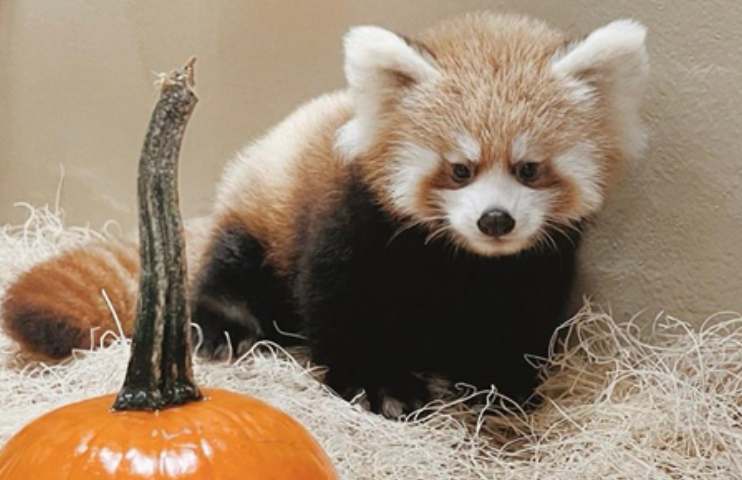Beloved red panda cub at Toronto Zoo unexpectedly passes away
In just his 3 months of life, he made a significant impact on all those at the zoo
The Toronto Zoo recently announced the passing of a 3-month-old red panda cub, who was named Dash, and affectionately known as Baby Spice.
Dash, or "Baby Spice," posing with a pumpkin (Photo courtesy of Toronto Zoo).

According to an organizational release,1 on Saturday, October 22nd at the beginning and end-of-day check-ins, the cub displayed no signs of illness. However, on Sunday morning, the wildlife care staff heard the cub vocalizing and then discovered he was lying on his side and extremely weak. He was immediately sent to the Wildlife Health Centre for treatment by the Toronto Zoo veterinary team and put on oxygen, administered fluids, given antibiotics, and warmed up as his temperature was low. Though stable for a brief period, he then suddenly stopped breathing and had no pulse. Resuscitation attempts were futile.
Additionally, staff contacted the veterinarian responsible for the Association of Zoos and Aquarium’s Red Panda Species Survival Program who noted that in cases like this, nothing more could be done. A post-mortem exam was performed to obtain samples for further testing which to understand what caused his sudden death.
During his short life, Dash made a significant impact and had gained a substantial following on the Toronto Zoo social media.
“Dash brought us keepers so much joy. It was wonderful to see his mom, Paprika, become such an amazing mother and to see the bond develop between her and Dash. We enjoyed watching him grow and meet every milestone with gusto. Every daily weigh-in was the highlight of our day and we loved seeing his little “Yoda” face every time we opened the nestbox, commented Dash’s wildlife care keepers, in the release.1 “To watch as he grew from a hesitant cub to a brave little boy will be one of our fondest memories. We are sad that our time with him was so short but we will cherish every moment we shared with him.”
Wildlife care staff will further monitor Paprika, and currently she is adapting well without Dash by her side. This tragic loss demonstrates the fragility of cubs, even months after birth and as they transition from juveniles to adulthood.
Red pandas are a challenging species to breed because of pre- and post-partum complications with offspring survival. The release1 cites research conducted by the Cincinnati Zoo that displays a high percentage of early pregnancy loss in this species compared to others, with 40% of pregnancies being lost before birth. Similar losses are documented after birth with around 40% of cubs dying within 1 year of birth. The low survival rates have a major effect on the growth of the red panda population under human care. In the wild, red panda cubs confront similar mortality rates because of their vulnerable state at birth and the continual anthropogenic pressures.
Reference
Your Toronto Zoo saddened to announce passing of red panda cub. News release. Toronto Zoo. October 24, 2022. Accessed October 28, 2022. https://www.torontozoo.com/mediaroom/press2022/20221024A









